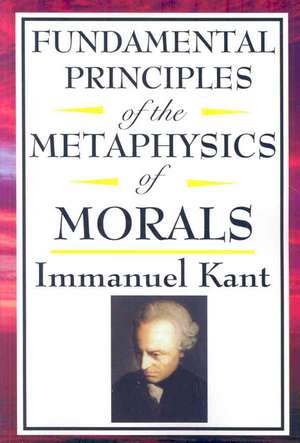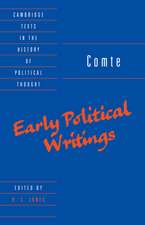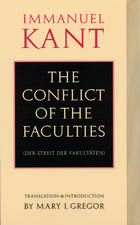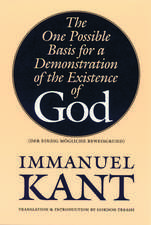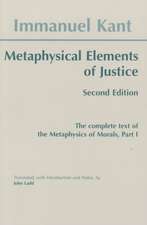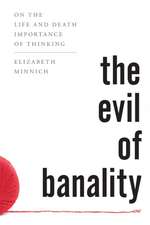Fundamental Principles of the Metaphysics of Morals
Autor Immanuel Kanten Limba Engleză Paperback – 17 feb 2008
| Toate formatele și edițiile | Preț | Express |
|---|---|---|
| Paperback (4) | 32.54 lei 3-5 săpt. | |
| Dover Publications – 30 apr 2005 | 32.54 lei 3-5 săpt. | |
| A & D Publishing – 17 feb 2008 | 75.43 lei 6-8 săpt. | |
| COSIMO CLASSICS – 30 apr 2009 | 76.18 lei 6-8 săpt. | |
| COSIMO CLASSICS – 30 oct 2008 | 82.46 lei 6-8 săpt. | |
| Hardback (1) | 131.40 lei 6-8 săpt. | |
| A & D Publishing – 3 apr 2018 | 131.40 lei 6-8 săpt. |
Preț: 75.43 lei
Nou
Puncte Express: 113
Preț estimativ în valută:
14.44€ • 14.96$ • 12.05£
14.44€ • 14.96$ • 12.05£
Carte tipărită la comandă
Livrare economică 21 martie-04 aprilie
Preluare comenzi: 021 569.72.76
Specificații
ISBN-13: 9781604592559
ISBN-10: 1604592559
Pagini: 80
Dimensiuni: 152 x 229 x 5 mm
Greutate: 0.13 kg
Editura: A & D Publishing
ISBN-10: 1604592559
Pagini: 80
Dimensiuni: 152 x 229 x 5 mm
Greutate: 0.13 kg
Editura: A & D Publishing
Notă biografică
Immanuel Kant ( 22 April 1724 - 12 February 1804) was an influential German philosopher[23] in the Age of Enlightenment. In his doctrine of transcendental idealism, he argued that space, time, and causation are mere sensibilities; "things-in-themselves" exist, but their nature is unknowable.[24][25] In his view, the mind shapes and structures experience, with all human experience sharing certain structural features. In one of his major works, the Critique of Pure Reason (1781; second edition 1787),[26] he drew a parallel to the Copernican revolution in his proposition that worldly objects can be intuited a priori ('beforehand'), and that intuition is therefore independent from objective reality.[b]
Kant believed that reason is also the source of morality, and that aesthetics arise from a faculty of disinterested judgment. Kant's views continue to have a major influence on contemporary philosophy, especially the fields of epistemology, ethics, political theory, and post-modern aesthetics. He attempted to explain the relationship between reason and human experience and to move beyond the failures of traditional philosophy and metaphysics. He wanted to put an end to what he saw as an era of futile and speculative theories of human experience, while resisting the skepticism of thinkers such as David Hume. He regarded himself as showing the way past the impasse between rationalists and empiricists,[28] and is widely held to have synthesized both traditions in his thought.[29]
Kant was an exponent of the idea that perpetual peace could be secured through universal democracy and international cooperation. He believed that this would be the eventual outcome of universal history, although it is not rationally planned.[30] The nature of Kant's religious ideas continues to be the subject of philosophical dispute, with viewpoints ranging from the impression that he was an initial advocate of atheism who at some point developed an ontological argument for God, to more critical treatments epitomized by Schopenhauer, who criticized the imperative form of Kantian ethics as "theological morals" and the "Mosaic Decalogue in disguise",[31] and Nietzsche, who claimed that Kant had "theologian blood"[32] and was merely a sophisticated apologist for traditional Christian faith
